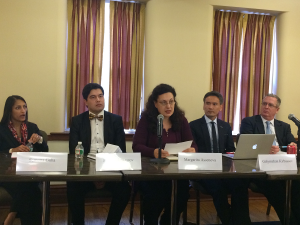WASHINGTON – The challenges and opportunities of regional integration in Central Asia were recently brought back to light at an international conference, which gathered U.S. government officials, Central Asian scholars and American experts on the region, as well as representatives of Washington’s diplomatic corps and media. The forum, “Prospects for Regional Integration in Central Asia,” was co-organised by the Central Asia Programme at George Washington University and the Kazakh embassy in the United States.
 In his opening remarks, Yerkin Akhinzhanov, deputy chief of mission at the embassy, said that “in the 21st century, when the global economy is more interconnected than ever before, Astana strongly believes that the economic fates of Kazakhstan and our neighbouring Central Asian countries are inseparable and we need to spur closer cooperation to achieve our mutual goals.”
In his opening remarks, Yerkin Akhinzhanov, deputy chief of mission at the embassy, said that “in the 21st century, when the global economy is more interconnected than ever before, Astana strongly believes that the economic fates of Kazakhstan and our neighbouring Central Asian countries are inseparable and we need to spur closer cooperation to achieve our mutual goals.”
He added that this understanding underpins Kazakhstan’s Foreign Policy Concept released earlier this year. In a broad redefinition of the country’s strategic priorities, Kazakh President Nursultan Nazarbayev identified intraregional integration in Central Asia as the core of the country’s foreign policy doctrine.
In the speech to a packed room at the university’s alumni house, Akhinzhanov offered Astana’s vision for regional integration, from which Kazakhstan, the world’s largest landlocked country, stands to gain. One part is the country’s first comprehensive transportation infrastructure development plan, which the government drafted in collaboration with the World Bank and adopted last November with the goal “to realise Kazakhstan’s ambitions to become a key transit hub for Eurasia and beyond.”
Akhinzhanov framed the efforts to establish the Kazakhstan Agency for International Development, or KazAID, as an effective mechanism for improving stability and prosperity in the region.
“Kazakhstan firmly believes that it is the right moment for us to forge an amalgam of shared strategic interests and objectives,” the Kazakh diplomat said, “and this challenging task requires the hard work of diplomacy, investment and a long-term approach to building stronger people-to-people contacts.”
 Continuing on this idea, Fatema Sumar, deputy assistant secretary for South and Central Asia who covers regional affairs at the U.S. State Department, said the region has “enormous barriers preventing the movement of people, goods, energy and ideas.”
Continuing on this idea, Fatema Sumar, deputy assistant secretary for South and Central Asia who covers regional affairs at the U.S. State Department, said the region has “enormous barriers preventing the movement of people, goods, energy and ideas.”
She noted the recent developments, both on the regional and global fronts, which are having a real impact on the political, economic and security situation in Central Asia, including the transition in Afghanistan, drawdown of U.S. and coalition forces, growth of various extremist groups, including those from the region fighting in Syria and decrease in oil prices.
Speaking about Western sanctions against Russia, the Obama administration official acknowledged that the Central Asian governments who “share economic ties with Russia may be concerned about the medium-term impact low Russian growth rates will have for their economies.”
Reflecting on “the best plan” for the future of the Central Asian states, Sumar offered the U.S. answer, which basically revolved around “better governance, better education and better connectivity.” Sumar believes it will help counter emerging threats and improve security and stability by enhancing opportunity and creating shared prosperity.
She continued by quoting Kazakh Foreign Minister Erlan Idrissov, who highlighted Kazakhstan’s position as a land bridge between European and Asian markets during a speech last month at an Asia Society event in New York. She said Idrissov challenged “all of us to support a future where Central Asia is ‘land-linked’ rather than land-locked” and assured that is exactly the vision the United States is supporting through the New Silk Road initiative.
Sumar concluded by saying that having travelled extensively across the region of Central and South Asia she was “personally impressed by the real progress we have seen in recent days to start building this type of regional connectivity,” but admitted that in many ways this will be a generational goal.
Sumar’s remarks were followed by two panels that featured presentations by some of America’s prominent experts on Central Asia, such as Sumona Guha of Secretary of State John Kerry’s policy planning staff, Andrew Kuchins of the Center for Strategic and International Studies, Margarita Assenova of the Jamestown Foundation and Marlene Laruelle of George Washington University, as well as Rumsfeld Fellows Anuar Ayazbekov of Kazakhstan and Farrukh Iznazarov of Uzbekistan.
The gathering was one of the latest in the series of events at George Washington University since the launch of its Kazakhstan Initiative a year ago. Previous multi-discipline conferences featured a keynote address in November 2013 by Kazakhstan’s most acclaimed poet and diplomat Olzhas Suleimenov and discussions on soft security challenges in Central Asia and societal opportunities for youth in Kazakhstan earlier this year.
“By blending history and culture with policy discussions we have attempted to promote the historic and, we hope, future role of Central Asia as a vital hub of global commerce, ideas and culture,” Akhinzhanov said in his comments to the media.
